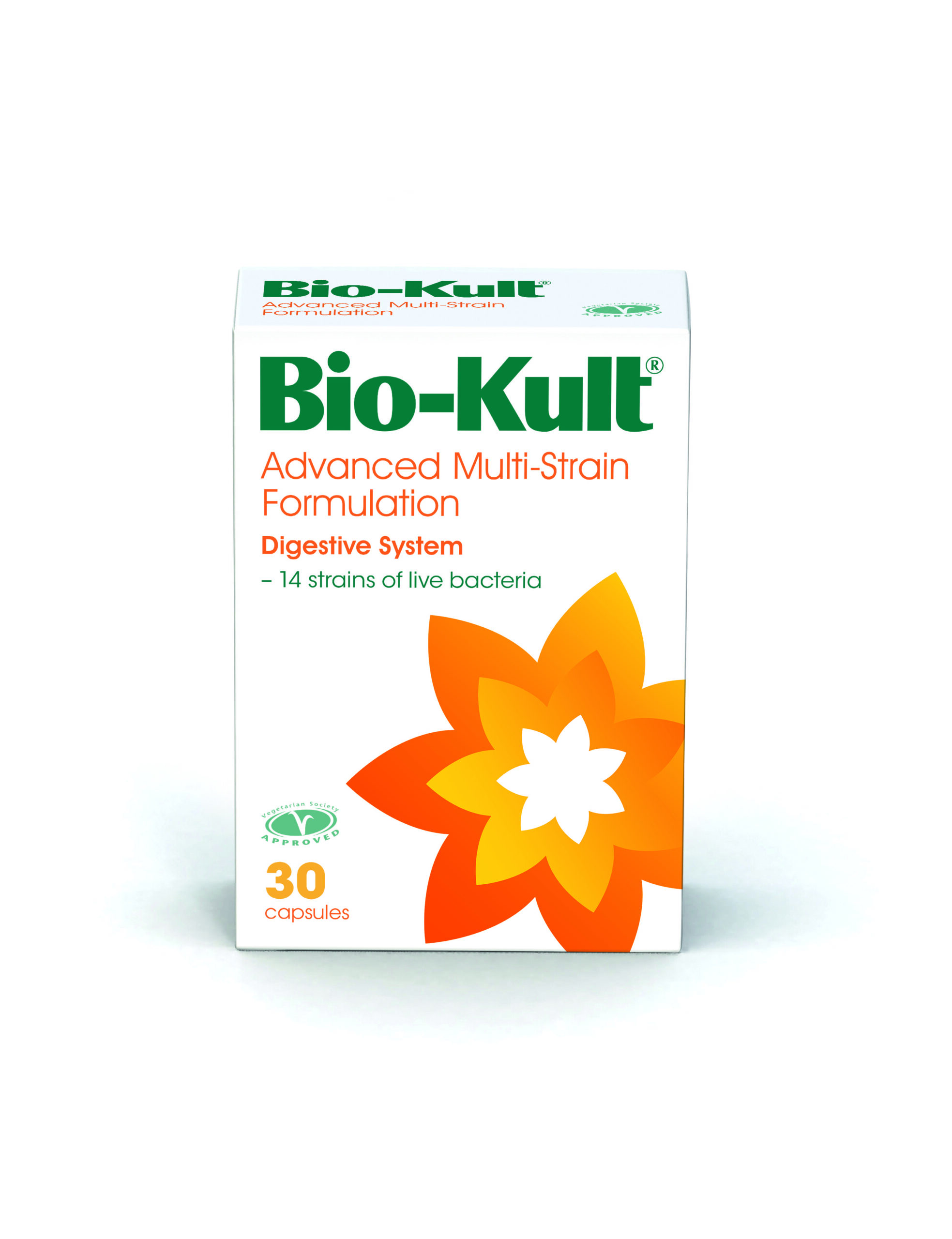
Mood Boosting Foods
By Hannah Braye, Nutritional Therapist at Bio-Kult (www.bio-kult.com)
It is increasingly being recognised that what we eat plays a crucial role not just in our physical health but also for our mental health and mood. Food is not merely an energy source, providing calories to fuel the body. The many nutrients it contains also act as messengers, helping different organs and bodily systems (including the brain) to communicate and function optimally. Nutritional psychiatry is a growing discipline focusing on the use of food and nutrients as part of an integrated approach to support good mental health. Below, Hannah Braye, Nutritional Therapist at Bio-Kult (www.bio-kult.com) lists foods to incorporate into your diet to help boost mood:
Fruits and vegetables
Fruit and vegetables are rich in nutrients, including antioxidants and it is reported they may modify brain serotonin status and have a positive effect on mood. A large review of available evidence in 2019 found that fruit andvegetable intake was associated with decreased risk of depression.1 Aiming for 2 fruit and at least 5 portions of vegetables a day is a good target. Eating a variety of different coloured fruit and veg may be particularly beneficial, as the different colour pigments reflect the different micronutrients each contains. For example, orange fruit and veg are a source of beta-carotene (the precursor to vitamin A), whilst purple varieties contain flavonoids such as proanthocyanidins and red varieties contain the antioxidant lycopene.
Fermented foods and live bacteria supplements
Our gut bacteria (the microbiome) produce numerous neurotransmitters and help to regulate the signals that are sent from the gut to the brain, via neurological, immunological and hormonal pathways. The gut is increasingly being seen as the second brain, so it’s perhaps unsurprising that studies are showing promising results in mood disorders from interventions designed to improve gut microbial balance. Traditionally fermented foods such as live plain yoghurt, kefir (a fermented milk drink), sauerkraut, kimchi and kombucha are a great way to introduce new and varied beneficial microorganisms to the gut. These can be purchased from health food stores, many supermarkets or easily made at home.
Taking a live bacteria supplement is another way to support healthy microbial balance and potentially improve mood. Bio-Kult Advanced Multi-Strain Formulation (RRP £9.48) was recently used in a soon to be published clinical trial at The University of Oxford and the results featured in a recent BBC documentary – The Truth About Improving Your Mental Health. In the double-blind placebo controlled trial, 70 people who were experiencing low mood, were given either Bio-Kult Advanced or placebo for a month. The participants reported their mood via a Patient Health Questionnaire for Depression (PHQ-9 Questionnaire), additionally cortisol levels were tested through salivary analysis. The result from the documentary showed a 20% improvement in mood for those in the placebo group compared to a 50% improvement in mood in those taking Bio-Kult. The supplement group also reported a 50% improvement in their concentration. While there were no effects on cortisol levels in the placebo group, the Bio-Kult group saw a trend towards decreased cortisol levels in their saliva, which suggests possible benefits forstress levels.
Prebiotic foods
A further way to support the growth of beneficial species in the gut is to increase intake of prebiotic foods. Prebiotics are types of fibre which are indigestible by humans but which provide a food source for beneficial species in the gut such as bifidobacteria and lactobacilli. Fibre rich foods (plants) are the best source of prebiotics. Eating a wide variety of plant foods (over 30 different types a week) has been shown to be of particular benefit for microbial diversity in the gut. Foods especially high in prebiotics include: onions, garlic, leeks, spring onion, slightly green bananas, dandelion, Jerusalem artichoke and asparagus.
Tryptophan rich foods
Tryptophan is the pre-cursor to serotonin (our happy hormone). As an essential amino acid, the body cannot create it and we must obtain it from the food we eat. However, only around 3% of dietary tryptophan is utilised for serotonin production (and this may be reduced even further in times of stress). Ensuring you have good sources of tryptophan in the diet, such as turkey, beef, bananas, beans, cottage cheese, nuts and seeds is therefore important. Interestingly, research also suggests that the composition of our gut bacteria can affect the metabolism of tryptophan, increasing the pool available for conversion to serotonin in the brain. Another reason to look after your gut health!
Omega 3
The central nervous system (CNS) has the highest concentration of lipids (fats) in the body after adipose tissue. Among these lipids, the brain is particularly enriched with polyunsaturated fatty acids (PUFAs) including omega 3. PUFAs have received substantial attention as being relevant to many mental health disorders, including anxiety and depression. Experimental data indicates that omega 3 PUFAs can modulate neurobiological processes involved in the pathophysiology of these conditions. In particular, omega 3 PUFAs are highly anti-inflammatory. Omega 3 is found in highest amount (and its active forms EPA and DHA) in oily fish such as salmon, mackerel, anchovies, sardines and herring. Vegetarian sources include flaxseeds, chia seeds and hemp seeds. However, these forms of omega 3 have to be converted by the body into the active forms and not everyone is efficient at this process.
Vitamin D
Certain types of low mood (such as Seasonal Affective Disorder (SAD)) have been linked to low vitamin D levels during the winter months. Research indicates that vitamin D helps maintain serotonin concentrations in the brain.2 Fat soluble Vitamin D is synthesised in the skin from cholesterol after exposure to UV rays. Between October and April in the UK we cannot synthesise adequate amounts of vitamin D from the sun and it is now well known that many people in the UK are deficient. If you’re feeling low, getting your vitamin D levels checked and supplementing if needed is recommended. Vitamin D is found in only a few foods such as eggs, oily fish and mushrooms, so as we come into the spring/summer months, try and spend some time outdoors each day with your arms/legs and face exposed (avoiding the hot midday sun).
Magnesium rich foods
Magnesium (Mg) is an essential mineral utilised in the human body as a cofactor in over 300 biochemical reactions. The anti-anxiety potential of Mg has been extensivelydemonstrated in animal research and a relationship between Mg status and anxiety is also evident in humans. For example, anxiety related to stressful exam conditions has been shown to increase urinary Mg excretion, resulting in a reduction of Mg levels.3 Lower dietary levels of Mg have also been associated with increased subjective anxiety.4 Mg also modulates activity of the hypothalamic-pituitary-adrenal (HPA) axis which plays a central role in the stress response. Mg supplementation has been shown to reduce the activity of the HPA axis,3 and circulating cortisol levels.5 Foods particularly high in magnesium include leafy green vegetables (e.g. kale, spinach, collard greens), avocado, nuts and tofu.
Mediterranean style diet
A growing body of evidence suggests an inverse association between adherence to a Mediterranean dietary pattern and odds of psychological disorders including depression, anxiety and psychological distress.6,7 A traditional Mediterranean diet focuses on high consumption of vegetables, fruits, olive oil, legumes, fish, whole grain cereals, nuts and seeds, moderate consumption of dairy and poultry and low consumption of processed foods, sugary foods, red meat and vegetable oils.
It’s likely the beneficial effect seen from a Mediterranean diet are multi-factorial, relating to nutritional and social factors. The diet is high in anti-inflammatory compounds; polyphenols from olive oil, fruit and veg and omega 3 from oily fish. It is also high in fibre from wholegrains and legumes(helping to feed beneficial species of bacteria in the gut) and low in sugar, helping to regulate blood glucose levels. There is also a strong focus on eating as a social event.
2Sabir MS, Haussler MR, Mallick S, et al. Optimal vitamin D spurs serotonin: 1,25-dihydroxyvitamin D represses serotonin reuptake transport (SERT) and degradation (MAO-A) gene expression in cultured rat serotonergic neuronal cell lines. Genes Nutr 2018; 13. DOI:10.1186/s12263-018-0605-7.
3Boyle NB, Lawton C, Dye L. The effects of magnesium supplementation on subjective anxiety and stress—a systematic review. Nutrients. 2017; 9. DOI:10.3390/nu9050429.
4Jacka F, Overland S, Stewart R, Tell G, Bjelland I, Mykletun A. Association between magnesium intake and depression and anxiety in community-dwelling adults: The Hordaland health study. Aust N Z J Psychiatry 2009; 43: 45–52.
5Held K, Antonijevic IA, Künzel H, et al. Oral Mg2+ supplementation reverses age-related neuroendocrine and sleep EEG changes in humans. Pharmacopsychiatry2002; 35: 135–43.
6Trovato GM, Catalano D, Martines GF, Pace P, Trovato FM. Mediterranean diet: Relationship with anxiety and depression. Ann. Neurol. 2014; 75: 613.
7Sadeghi O, Keshteli AH, Afshar H, Esmaillzadeh A, Adibi P. Adherence to Mediterranean dietary pattern is inversely associated with depression, anxiety and psychological distress. Nutr Neurosci 2019. DOI:10.1080/1028415X.2019.1620425.




